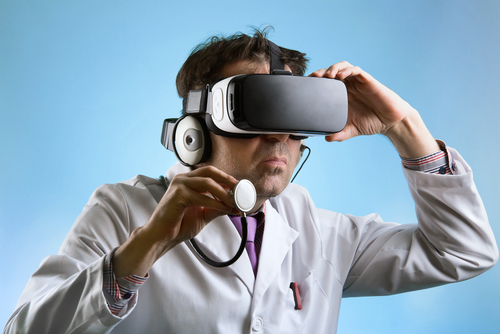You’re walking through a forest. Everything looks magical. The colors are vivid, you can see the light shining through the leaves, and there’s a peaceful calm around you. All of a sudden, a spider crawls out from behind a tree. You turn to look around for somewhere to go, but there’s nowhere. You turn around to look at the spider and it’s gone. Then, turning around once more, it’s suddenly right in front of you. Screaming, you panic to run away. A voice chimes in reminding you to breathe, center yourself, and be calm. Remember, the voice says, it isn’t real. The virtual reality scene ends.
Getting Started
Next, you find yourself in a room with a virtual therapist. They walk through the exercise with you and teach you techniques for handling your fears. Together, you transport to a peaceful garden where you participate in a guided meditation, calming music playing in your ear. Once that is finished, you take a survey and numbers come on the screen. The therapist informs you of the progress you’ve made. See you next session.
Future of Virtual Reality
Virtual reality is the future and it is already here. High definition immersive experiences are taking the world by storm. Headsets for virtual reality have been designed so that you can just snap your phone into place an run an app. While virtual reality has been thought to be for gaming, it is seeing a lot of development and experimentation in the potential for treating mental health. Immersive experiences could help reduce symptoms of depression and anxiety, help addicts and alcoholics walk through triggering situations, and provide a more intensive platform for education. For confronting fears, phobias, and habits like smoking, research is already being done with psychotherapists administering the virtual reality programs. More serious mental health conditions and addiction or alcoholism or starting to develop platforms.
Online therapy and texting therapy are becoming increasingly popular. Treatment centers are working to develop online platforms similar to the ones online education programs use, to create more accessible and affordable treatment. The effectiveness of digital treatment methods is still being evaluated as the technology is new.
Millions of people around the world do not have access to treatment for their mental health conditions. Virtual reality could be one more avenue for getting people the help they need in a timely matter.
LEAD Recovery Center is committed to providing the highest quality of mental health care to men and women seeking extended length treatment programs. At all levels of care we emphasize personal development and leadership through life coaching and adventure therapy. For more information, call 800-380-0012.


